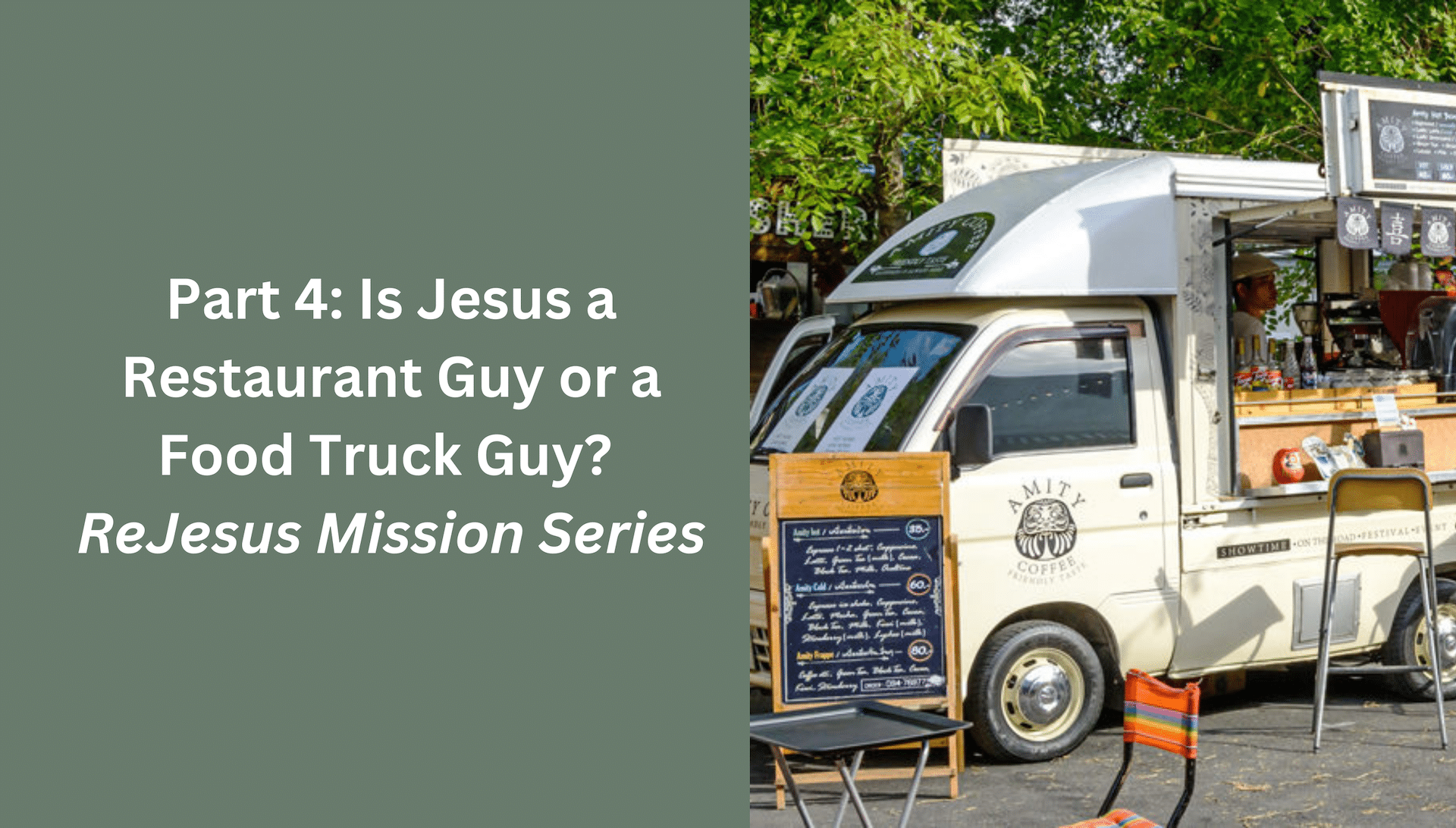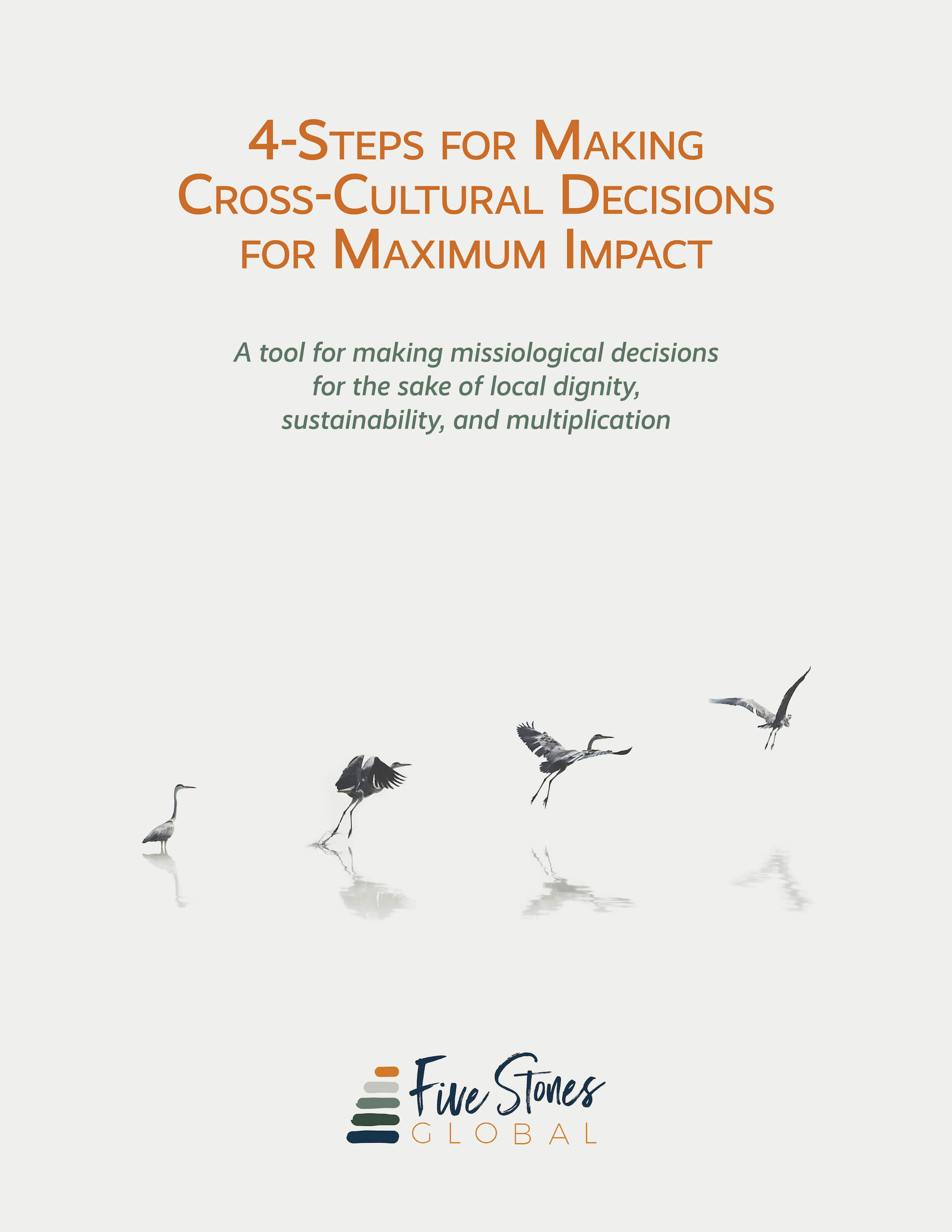By Jean Johnson
Are you a ‘food truck’ disciple-maker or a ‘restaurant’ disciple-maker?
In Part 3 of this ReJesus Missions Series: Jesus’ 8-Fold Pattern of Orthopraxy, we left off with this question:
- If Jesus went into the food business (serving his 8 options), do you think he would open a brick and mortar restaurant or a food truck?
From reading the gospel of Luke, I am convinced Jesus would serve these 8 main dishes (Jesus’ 8-fold pattern of orthopraxy) via a food truck, rather than a brick and mortar restaurant.
A food truck is lighter on your wallet, requires no property tax, is low maintenance, and virtually advertises itself, all ingredients of a movement for Christ.
Food Liability Insurance Program (FLIP)[1]gives advice to those pursuing the food business and weighing their options between going mobile or going brick and mortar. Below I list FLIP’s suggested three main advantages to mobile food trucks and show how Jesus fulfilled each one:
Advantage 1: “Better site selection – If one site isn’t profitable, you’ve got wheels! Just move to where the paying customers are located.”
Jesus’ approach allowed him to go to the best site selection:
Everyone: Wait. This is only the son of Joseph, right?
Jesus: You’re about to quote the old proverb to Me, “Doctor, heal yourself!” Then you’re going to ask Me to prove Myself to you by doing the same miracles I did in Capernaum. But face the truth: hometowns always reject their homegrown prophets. . . .
The people in the synagogue became furious when He said these things. They seized Jesus, took Him to the edge of town, and pushed Him right to the edge of the cliff on which the city was built. They would have pushed Him off and killed Him, but He passed through the crowd and went on His way.
Next He went to Capernaum, another Galilean city (Luke 4:23-24, 28-33, VOICE).
Advantage 2: “Versatile – You can cater a wedding one day, attend a farmer’s market the next, or be part of the next county fair.”
Jesus’ approach was versatile in any setting:
Three days later, they all went to celebrate a wedding feast in Cana of Galilee. Mary, the mother of Jesus, was invited together with Him and His disciples. While they were celebrating, the wine ran out; and Jesus’ mother hurried over to her son (John 2:1-3, VOICE).
Jesus gets into one of the boats and asks its owner, Simon, to push off and anchor a short distance from the beach. Jesus sits down and teaches the people standing on the beach (Luke 5:3, VOICE).
Jesus continued from there toward Jerusalem and came to another village. Martha, a resident of that village, welcomed Jesus into her home (Luke 10:38, VOICE).
Advantage 3: “Customer outreach is easier – Food aficionados are looking for the next best thing in cuisine but don’t want to travel far to find it. As a mobile food business, you can shorten the distance between you and your next fan.”
Jesus’ approach shortened the distance between Him and His seekers:
The emissaries whom Jesus had sent out returned, and Jesus took them away from the crowds for a time of retreat in a city called Bethsaida. They gave Jesus a full report of their accomplishments and experiences. But soon the crowds discovered where they were and pursued Him. Jesus didn’t turn them away; He welcomed them, spoke of the kingdom of God to them, and brought health to those who needed healing (Luke 9:10-11, VOICE).
Figuratively speaking, Jesus packed his 8-fold pattern of orthopraxy in a food truck.
1. Jesus was able to move freely and be a presence in key places and cultural events within society.
2. When Jesus discovered that people were not hungry for his menu, He simply moved on to true seekers.
3. Jesus made Himself accessible to everyone. He strived to shorten the distance between him and His seekers.
How about you? How do you practice missions and pass on Jesus’ menu? Are you more of a restaurant person or a food truck person?
I will leave you here with one question to think about for next time:
I wonder how much more impact we would make in our own neighborhoods and among the nations, if we were ‘food truck’ disciple-makers and missionaries, rather than ‘restaurant’ disciple-makers and missionaries. What might that look like for you in the role and place that God has placed you?
[1] Food Liability Insurance Program (FLIP), “Whipping Up A new Food Business? Here’s The Dish On Going Mobile VS. Stating A Brick And Mortar Restaurant,” https://www.fliprogram.com/blog/mobile-food-truck-vs-brick-and-mortar-restaurant.


